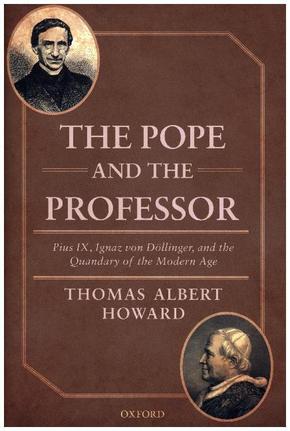
The Pope and the Professor - Pius IX, Ignaz von Döllinger, and the Quandary of the Modern Age
| Verlag | Oxford University Press |
| Auflage | 2017 |
| Seiten | 360 |
| Format | 16,0 x 24,0 x 2,5 cm |
| Print PDF | |
| Gewicht | 659 g |
| Artikeltyp | Englisches Buch |
| ISBN-10 | 0198729197 |
| EAN | 9780198729198 |
| Bestell-Nr | 19872919EA |
A history of the Catholic Church after the French Revolution through the story of the 'Döllinger affair'. Ignaz von Döllinger (1799-1890), was a leading critic of Pope Pius IX and in particular the doctrine of Papal Infallibility defined during the First Vatican Council.
The Pope and the Professor tells the captivating story of the German Catholic theologian and historian Ignaz von Döllinger (1799-1890), who fiercely opposed the teaching of Papal Infallibility at the time of the First Vatican Council (1869-70), convened by Pope Pius IX (r. 1846-1878), among the most controversial popes in the history of the papacy. Döllinger's thought, his opposition to the Council, his high-profile excommunication in 1871, and the international sensation that this action caused offer a fascinating window into the intellectual and religious history of the nineteenth century. Thomas Albert Howard examines Döllinger's post-conciliar activities, including pioneering work in ecumenism and inspiring the"Old Catholic" movement in Central Europe. Set against the backdrop of Italian and German national unification, and the rise of anticlericalism and ultramontanism after the French Revolution, The Pope and the Professor is at once an endeavor of historical and theological inquiry. It provides nuanced historical contextualization of the events, topics, and personalities, while also raising abiding questions about the often fraught relationship between individual conscience and scholarly credentials, on the one hand, and church authority and tradition, on the other.
Inhaltsverzeichnis:
List of Figures
List of Abbreviations
Introduction
1: "The World is Collapsing": The Papacy, Memory, and Revolution
2: Between Munich and Rome: The Formation of a German Catholic Scholar
3: Conscience and Authority: The Vatican Council and Excommunication
4: After the Council: Renown, Christian Unity, and its Obstacles
Conclusion
Bibliography
Rezension:
With the sesquicentennial of Vatican I fast approaching, we are bound to see a spate of new volumes treating the history and theology of that council. However, not many of them are likely to match the erudition and depth of research manifest in Thomas Albert Howard's Magisterial Study. Ryan J. Marr, Newman Studies Journal
